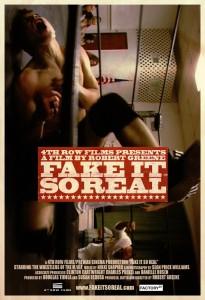Robert Greene found himself advocating for a crowd some people consider marginalized. In his film Fake It So Real, Greene portrays the lives of professional wrestlers as ones of struggle in and out of the ring.
unique cinematic marriage of art and wrestling.
Greene’s documentary, focused in Lincolnton, spends one week in the lives of a collection of professional wrestlers. However, according to Greene, their title may be misleading: while the athletes are professional, they aren’t paid well.
“It’s very minor leagues of pro-wrestling,” Greene said. “You have this collection of guys: Gabriel, who’s trying to make a name for himself, and Jeff, who’s the outlaw leader. They’re all struggling artists in a way.”
Greene currently works for 4th Row Films, a production company in New York. On his resume, Greene has a number of documentaries such as his “Owning the Weather” and “Kati with an I.” Collectively Greene has directed, produced or edited about 12 different documentaries.
“It’s always this compressed time line,” Greene said. “There’s always some sort of a goal at the end of it. I really like that structure and wanted to apply it to ‘Fake It So Real.’”
Making a wrestling film was something Greene had dreamed of as a child.
“I grew up a pro wrestling fan and still follow it,” Greene said. “I’m a big art and documentary film lover, but there’s no doubt that pro-wrestling was my first true love of art.”
Chris Solar, one of the film’s main characters, is Greene’s cousin and played a large part in the creation of the story’s concept.
“[Solar] was born with his intestines outside of his body,” Greene said. “As a child growing up, Chris was very fragile. We couldn’t really play with him or roughhouse, he was always so sick. One day after he turned 18, he told us he was going to be a pro wrestler … we were like, ‘what?’ I wanted to use the film to tell his story.”
“Fake It So Real” is more than Chris Solar’s story; it also reflects Greene’s history at N.C. State.
“I took the journalism classes and wrote for Technician, but it wasn’t until I took film classes that I realized what I wanted to do,” Greene said. “Although I totally reject the idea that documentaries are journalism, I think they’re movies first, obviously they have something in common with journalism. That instinct brought me to making documentaries.”
Greene’s instincts have helped lead him to a number of different projects. Omar Broadway Film, Making The Boys and Hey Bartender are just some of the films Greene is currently a part of.
“The idea that my projects and movies can be seen by students and people in North Carolina is huge,” Greene said. “Doing what you want and love to do and having that get back to where you call home, is a good feeling to have.”
Fake It So Real has received attention from critics such as Richard Brody and Roger Ebert. Making The New Yorker’s list of top 15 movies and being one of Ebert’s 12 favorite documentaries from 2012 are just some of the praise Greene’s film has garnered.
“All that recognition really means is that we can keep making movies,” Greene said. “That stuff is incredible … it’s such a small personal film but the prospect of what we can continue to make is what it all comes down to.”
Greene said the title is provocative in many ways.
“The title is a lyric from a song by the band Hole,” Greene said. “The word fake really does make people think about wresting in a certain way. In the movie, the wrestlers defend wrestling and very much cut down the idea that it’s fake … they say it’s staged.”
According to Greene the wrestlers argued with him that there’s nothing fake about real doctor bills.
“Chris Solar says something that stands out in the film,” Greene said. “He says something like, ‘I don’t think it’s fake, I think it’s staged. No one goes to a play and says it’s fake.’”
Greene explained that the wrestlers dealt with their distaste for the title in perfect wrestling fashion — they ribbed him.
“They took me in the back making it seem like they were going to kick my butt,” Greene said. “They were just ribbing me the whole time. I never agreed to change the title but when they were ribbing me I remember saying, ‘Look, if you want me to explain the title, I can, but the title is too good to change.’”
Everything aside, Greene expressed that the biggest compliment he strives for is nothing more than a connection to what the film is all about.
“People go into it thinking that they hate wrestling,” Greene said. “You really learn to love these guys and grow to see them as artists struggling to do what they love. That idea is something everyone can root for. You might not be a huge fan of wrestling but you can watch the film and still walk away with something.”








